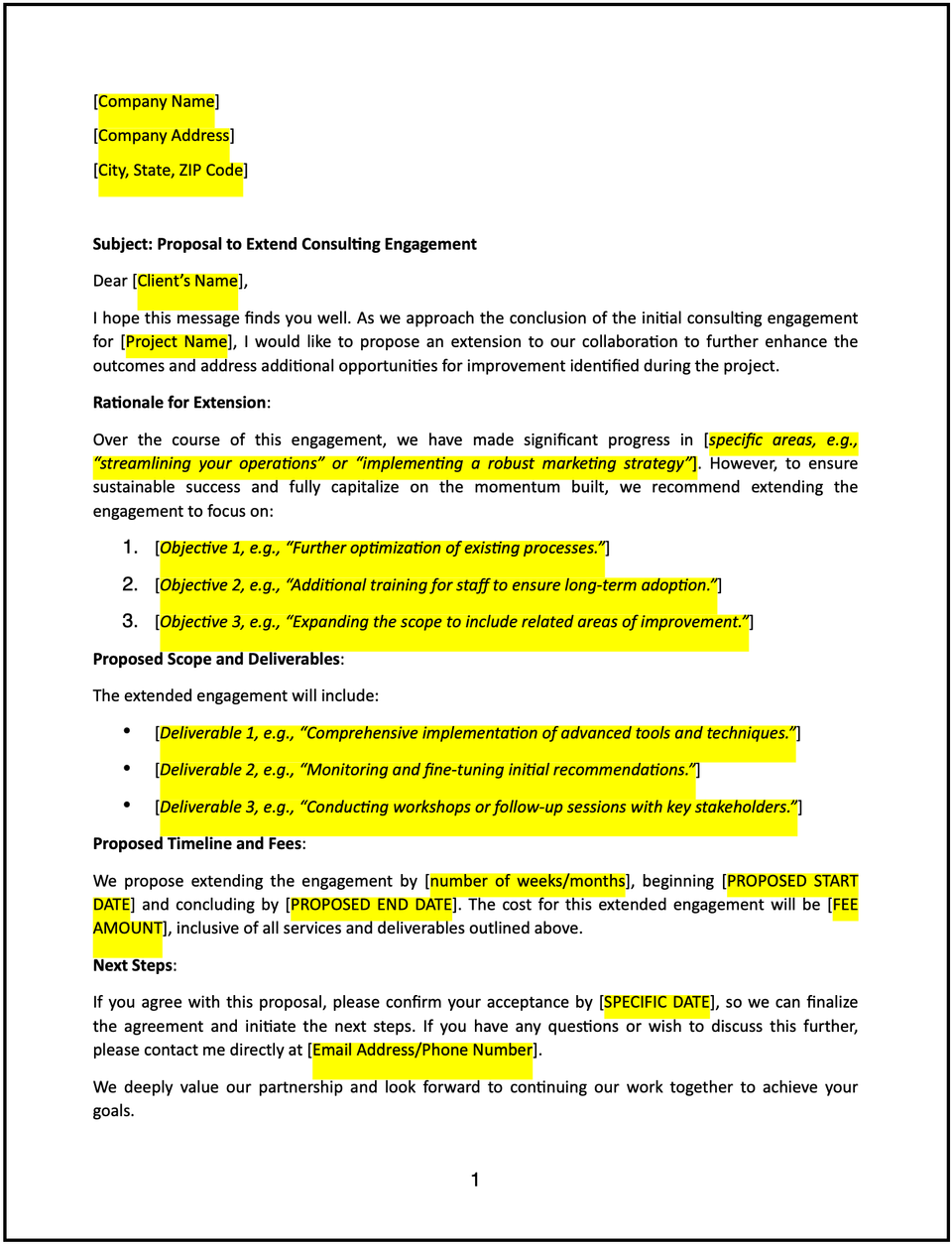Letter to extend consulting agreement: Free template

Letter to extend consulting agreement
A letter of proposal to extend a consulting agreement is a formal communication used to suggest continuing the consulting relationship beyond the original contract period. This letter outlines the reasons for the extension, its benefits, and any proposed adjustments to terms or deliverables.
How to use this letter to extend consulting agreement
- Open with an introduction: Address the recipient respectfully and reference the existing consulting agreement or project.
- State the purpose: Clearly communicate your intent to propose an extension of the agreement.
- Provide context: Briefly explain the rationale for the extension, such as ongoing project needs, additional goals, or unforeseen challenges.
- Highlight accomplishments: Acknowledge the successes or milestones achieved under the current agreement to reinforce the value of the partnership.
- Outline the proposed extension: Specify the new timeline, updated deliverables, or adjusted terms for the extended agreement.
- Highlight the benefits: Emphasize how the extension supports achieving project goals, ensures continuity, or adds value to the client.
- Suggest next steps: Propose a meeting or discussion to review the terms and finalize the extension.
- Maintain a professional tone: Ensure the letter is clear, respectful, and focused on fostering collaboration.
- Provide contact information: Include details for the recipient to reach out with questions or to schedule a discussion.
Benefits of using a letter to extend consulting agreement
This letter ensures a structured and professional way to propose an extension while fostering alignment and trust. Here’s how it helps:
- Promotes continuity: Extending the agreement ensures ongoing support and progress toward goals.
- Reflects professionalism: A well-crafted letter demonstrates respect and a commitment to the client’s success.
- Encourages collaboration: Proposing an extension fosters a stronger, long-term partnership.
- Ensures clarity: Outlining the extension terms avoids misunderstandings and aligns expectations.
- Builds trust: Proactively addressing ongoing needs demonstrates dedication to the project.
Tips for writing an effective letter to extend consulting agreement
- Be specific: Clearly describe the reasons for the extension, its benefits, and the proposed terms.
- Use professional language: Maintain a respectful and collaborative tone to build trust.
- Provide context: Reference the original agreement and explain how the extension aligns with project goals.
- Highlight mutual benefits: Emphasize how the extension creates value for both parties.
- Include actionable steps: Propose a follow-up discussion or meeting to finalize the extension details.
- Keep it concise: Focus on the essential points while ensuring the tone is professional and engaging.
Frequently asked questions (FAQs)
Q: What details should I include in this letter?
A: Include a reference to the current agreement, the rationale for the extension, proposed terms, and next steps.
Q: Should I personalize the letter?
A: Yes, addressing the recipient by name and referencing specific achievements or goals demonstrates attentiveness and professionalism.
Q: Who typically sends this letter?
A: Consulting firms, independent consultants, or project managers typically send this letter.
Q: How formal should this letter be?
A: The tone should be professional, respectful, and solution-oriented to foster trust and engagement.
Q: When should this letter be sent?
A: Send the letter before the current agreement expires to allow time for discussion and approval.
Q: Can this letter include updated pricing or terms?
A: Yes, outlining revised fees or terms ensures clarity and transparency in the proposed extension.
Q: Is acknowledgment from the recipient required?
A: While not mandatory, requesting acknowledgment or feedback ensures alignment and collaboration.
This article contains general legal information and does not contain legal advice. Cobrief is not a law firm or a substitute for an attorney or law firm. The law is complex and changes often. For legal advice, please ask a lawyer.


